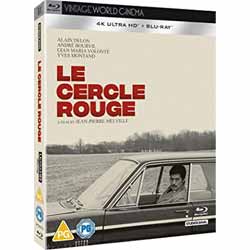|
Click here to return to the main site. Blu-ray Review
Siddhartha Gautama, The Buddha drew a circle with a piece of red chalk and said: When men, even unknowingly are to meet one day, whatever may befall each, whatever their divergent paths, on the said day, they will inevitably come together in the red circle. Rama Krishna... This is the scroll-up for Jean-Pierre Melville’s Le Cercle Rouge. And the first frame we see centres on a red traffic light and a near traffic collision. Riding in the back seat is Police Superintendent Mattei - André Bourvil, known for his comedy and musical roles, here playing a stoic head cop out to nab three upscale jewel robbers - on his way to fulfil the destiny of the Rama Krishna’s paradigm. A lot is made in the StudioCanal press notes of Melville’s relation to The Nouvelle Vague movement and it’s true that artisans in that wave praise him. I think Melville is something more than that and would presume to coin a new term just for him: Cinéma Existentiel. Everything Melville enthrals us with, from his signature mise en scéne, micro-measured cinematography, (Henri Decaë, who died this year) muted panoramic art direction, studied audio soundscape to deadpan impassive dramatic delivery, is designed to immerse us into the is of experience. A prisoner (Volontè) being transported by train by Superintendent Mattei, artfully uses a secreted safety pin to spring his handcuffs then hurls himself out the window. Mattei pulls the brake cord and bounds out after him. But the woods are too thick to get a good shot. He orders a search party including dogs but Volontè breaks his scent trail by swimming trough an icy stream. Earlier we’ve seen Delon on his last night in prison, being briefed by a cop about a jewel robbery just asking for execution. He comes out of prison, connects with old fellow thieves and takes a wad of money. At every turn, he’s smarter than his cronies and ruthlessly deadly when they try to treat him the same. Murder is as routine as ordering a cappuccino. Best you just try to beat Delon and let him use a pool cue on you. Going for deadly force gets you an existential exam of where your face hits the forest floor. Delon uses his money to buy a used car. He sips coffee at a highway restaurant. And it’s only now that we hear music, though diegetic, from the place’s sterile alienated speakers. Outside, in the snow, Volontè creeps up to the cars in the parking lot, finds the one with the unlatched boot and wriggles inside. Delon comes out, drives away, outwits police at a roadblock and in pure French crime movie trope, drives out into a vast muddy field to have his first words with his compatriot. He’s greeted with Mattei’s holster automatic. He tosses over a pack of cigarettes and a lighter. What ensues then is the only smile exchanged in the entire movie. It’s not a big smile but in this taciturn world, it’s all you’re going to get. For Melville this is profound. Melville is able to create scenes where not much happens, yet where everything is happening. Experience, inchoate, immediate, unavoidable is what is known and what is known is what is communicated. The psychologist Carl Rogers called this congruence. Slowly as the threesome of thieves is formed - ah yes, Yves Montand, is the target shooter - whom we meet in the midst of alcoholic dt’s complete with lizards, snakes and all manner of creepy crawlies - essential to the inside success of the jewellery store heist because a crucial switch has to be knocked out by rifle shot - music creeps onto the soundtrack. Something low and pensive from a late night basement club where people come to brood and, yes, enjoy the atonal jazz. The music we’ve had before is the thrum of engines, whine of highway traffic, whirr of urban cacophony blurring into the back of the head. And then comes the heist. One must remember that silent film never died. This is in the grand tradition of great heist sequences where your language doesn’t matter because you know the universal patois of pilfery. Most film is radio with pictures. Turn off the picture and you still get 95% of the content. Pure film, in this case, Cinéma Existentiel, is picture with sound. There is a reason great directors like Tarantino love Melville. StudioCanal has prepped this classic (solid extras) for all current price ranges as well as future super modes on the horizon. This is like great music you can hear again and again. I’ve been very good about not spoiling this for you, except to say, Superintendent Mattei wears his sunglasses at night. Shooting glasses. Go with it. 10 John Huff Buy this item online
|
|---|

